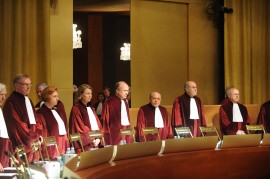 Everyone knows what is meant by the rule of law, don’t they? Successive governments have stood by and defended the idea; federalists have tried to take it into the international sphere. But what, precisely, does it mean?
Everyone knows what is meant by the rule of law, don’t they? Successive governments have stood by and defended the idea; federalists have tried to take it into the international sphere. But what, precisely, does it mean?
Remarkably enough, definitions of it have been few and far between; perhaps familiarity with it has bred contempt. My attention was drawn to a lecture by Lord Bingham, former Lord Chief Justice of England and Wales, in which he examined this question. It makes very fine reading, and you can read it here.
The heart of the idea is that the law applies to everybody, including the people who make and enforce it. Sovereign authority within the state is not unfettered. Federalism goes a step further to argue that sovereign authority outside the state should also be fettered in the same way. In Lord Bingham’s speech, this is his eighth consideration, international law.
The occasions when such an apparently commonplace notion becomes controversial are interesting indeed. There are two in the newspapers today.
The case of the late Alexander Litvinenko is one. It is not known who killed him, but fingers are currently pointing at elements of the Russian security services. A rather recondite weapon of choice, polonium 210, would be available only to a very few would-be assassins. Litvinenko himself was a former FSB agent and would have made a number of enemies who might have both motive and opportunity. And there have been many other similar cases in recent months in Russia itself. Correlation does not prove causation, I know, but the mind does start wondering.
Let us imagine that the police investigation points to the possible involvement of Russian officials in this affair? Will they be handed over for trial? Litvinenko was a British citizen, after all, and the British government can hardly be relaxed about what happened to him. Diplomatic relations with Russia are important, but so is the protection of the British public. How far might the British government push it?
Vladimir Putin, on becoming president of Russia, promised to establish a “dictatorship of law”. Maybe we will find he has only got half-way there.
The second case is the investigation into possible corruption in the arms deals with Saudi Arabia. It is rumoured that certain members of the Saudi royal family have made large amounts of money out of British arms exports, and they would be sorely embarrassed if this were to come to light in open court. Bribery, of course, is a criminal offence here, even if not in other parts of the world, and it may be that offences have been committed.
Reported today is a threat by the Saudi government to cancel the proposed purchase of Eurofighters if the criminal investigation is not abandoned. 50,000 jobs are said to be at stake. It would be a serious economic setback if the export contract were to be cancelled, but does that justify interfering with the course of the criminal law? The Daily Telegraph reports the concerns of politicians on both sides of the argument.
Fiat justitia ruat caelum?
